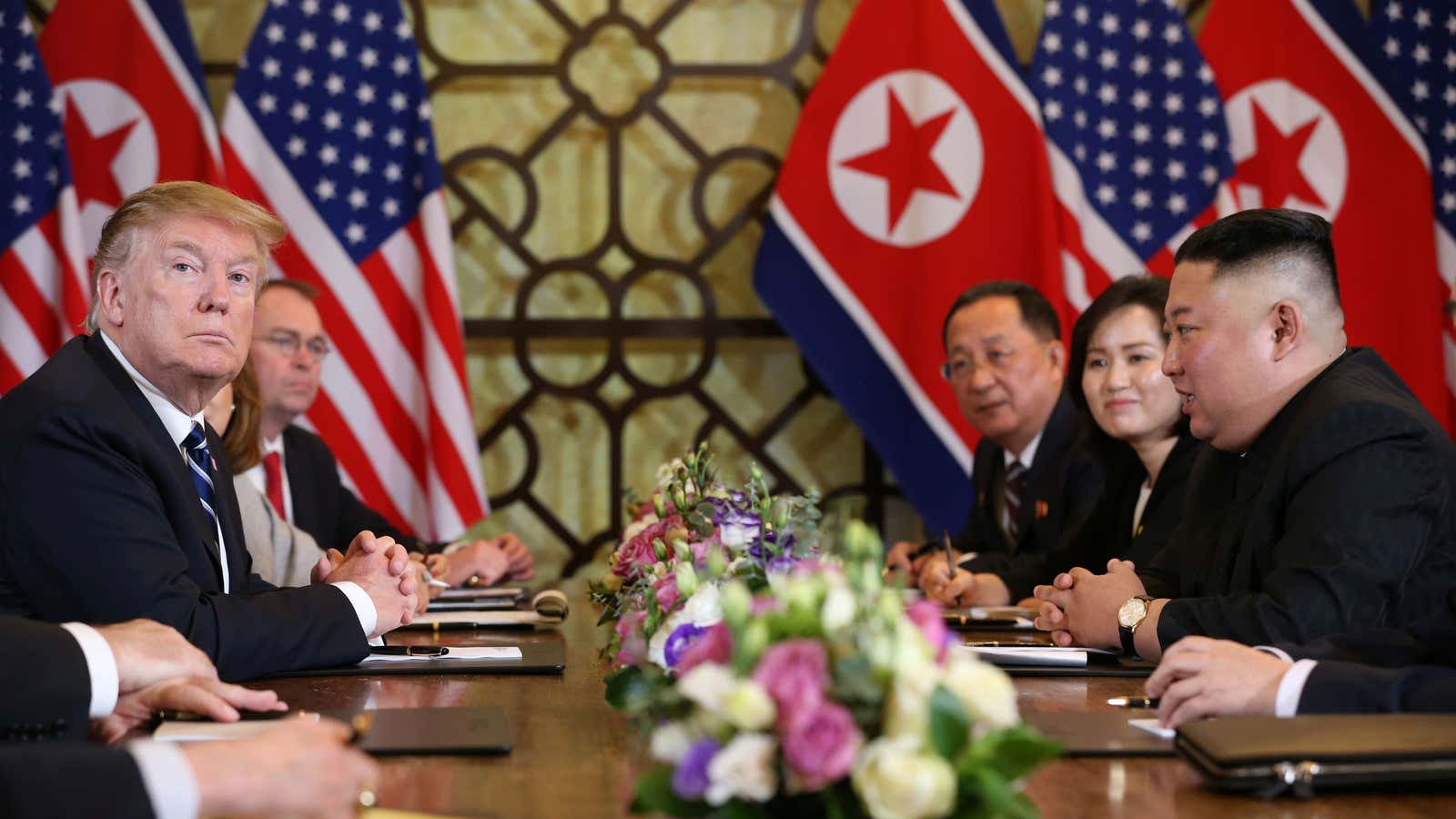Donald Trump’s aborted nuclear summit in Vietnam this week with North Korean dictator Kim Jong Un was a step in the right direction, a veteran nuclear negotiator said today (March 1), but the US president is the wrong man to strike a meaningful, lasting deal.
Trump has “made a strong and valiant effort, but he’s not the right person to do this, obviously,” Joel Wit, a senior fellow at the Stimson Center, a security policy think tank, told an audience at New York City’s Korea Society. “He’s not steady, he’s quirky, one day he wakes up and thinks one thing, the next day he wakes up and thinks another thing,” Wit said. “One minute he can seem like he loves Kim Jong Un, the next minute he walks out of the summit. This is who he is.”
This, he suggested, is not the kind of behavior that results in successful nuclear diplomacy.
Wit brings a unique perspective to the global post-summit analysis. A former US State Department official, Wit has negotiated nuclear arms agreements with both the Soviet Union and North Korea. He was a member of the Clinton administration team that reached the 1994 US-DPRK Agreed Framework, which temporarily froze North Korea’s plutonium production capabilities, and spent the next nine years years personally interacting with North Korean government officials while overseeing its implementation. (North Korea withdrew from the agreement in January 2003.)
Echoes of Reykjavik 1985?

Wit said the Hanoi summit was not the complete failure Trump critics believe it to be. Trump managed to cut through the “Gordian knot” that North Korea has long represented for US leaders, Wit said.
The aftermath of the summit could echo the 1985 summit in Reykjavik, Iceland between president Ronald Reagan and Soviet premier Mikhail Gorbachev, Wit said, which also ended at an impasse but led to a nuclear treaty later being signed based on progress made there. Trump could also become engulfed in the myriad domestic political problems he currently faces, Wit noted, and the process could peter out.
Both Trump and Kim “are heavily invested in this process,” maintained Wit. For Kim, “this is not a tactic, this is not a photo op. This is a real shift in North Korean policy, and he’s trying to move down a different road.” Kim pledged not to resume testing nuclear weapons or missiles this week.
Trump is also seemingly invested in continuing the talks, and sounded optimistic on Twitter when he returned to DC Friday morning:
North Korea has plenty of weapons
North Korea’s willingness to engage in talks now may be because it built up a large enough weapons arsenal under previous presidents, Wit believes.
George W. Bush dubbed the country part of an “axis of evil” in 2002; it withdrew from the 1994 agreement Wit helped to broker later that year, and conducted its first nuclear test in 2006. Barack Obama’s “strategic patience” approach assumed sanctions and diplomacy would eventually bring North Korea to the negotiating table. Instead, North Korea conducted five nuclear tests and launched three medium-range ballistic missiles toward Japan during Obama’s presidency.
“Every country that’s building nuclear weapons…they reach a point in their program where they decide how much is enough,” Wit said. Kim may have decided to “see what other opportunities are out there,” he said. “It doesn’t mean that they can’t resume these tests,” he said, and there’s no destruction of any nuclear testing site that is irreversible.
The Hermit Kingdom myth
Trump administration officials may finally be beginning to realize how complex US-North Korea relations are, Wit said, and abandoning the “comic book” narrative that has dominated US thinking on the country.
Each incoming president and administration needs to be educated on the topic, Wit said. Many US officials have bought into what he called the “myths of North Korea,” particularly the idea of an isolated “hermit kingdom” perpetually on the verge of imminent collapse.
“Don’t assume the people doing the educating are always the ones you want doing the educating,” Wit said, in what appeared to be a reference to John Bolton, Trump’s hawkish national security adviser, who is being blamed in some circles for sabotaging the Hanoi summit.
Trump may not be the man to deal with North Korea, and the US may not be the country, Wit conceded. Combine the lack of American understanding, a US habit of trying to use traditional foreign policy solutions to solve a “very untraditional problem,” and the political pitfalls, “it becomes almost impossible to deal with.”
